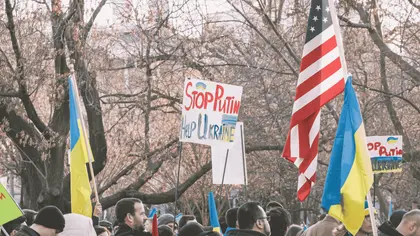The number of Americans worried about Russia’s full-scale invasion of Ukraine dropped to a new low just prior to Ukraine’s summer offensive, according to polling that may influence the domestic debate about the supply of military aid.
A national survey of 1,977 registered US voters, conducted June 6-7 with an unweighted margin of error of +/-2 percentage points, found that 77 percent of Americans are “somewhat concerned” to “very concerned” about the war.
This is the lowest level of concern since the war started – or a 10 percent drop since the tracking began. In March 2022, immediately after Russia launched its full-scale invasion of Ukraine, the same poll found that 87 percent of Americans were “somewhat concerned” to “very concerned”.
While US voters are now less worried than they were just after the invasion began, their overall levels of concerns remain high. Among Democrats, the concern level is at 82 percent; among Republicans, it is 72 percent.
However, Americans seem confident about their country’s stance on the war. The poll showed that only 17 percent of Americans think that their country is “not doing enough” in terms of supporting Ukraine. That percentage is the lowest since the war’s start.
Hip-pocket concerns and the prospect of a looming recession may be affecting Americans’ attitudes towards the war.
Morning Consult, an independent pollster and AI firm, reported that “US voters’ support for imposing sanctions on Russia, even if doing so causes inflation, has declined markedly since early in the war. Two in five US voters say they support such sanctions, a 16-point decline since April 2022.”

EU Transfers €1.5 Bln Raised From Russian Assets for Ukraine
The June poll follows March polling by Ipsos which found that 59 percent of all Americans supported further military aid for Ukraine – less than half (42 percent) of Republicans and 79 percent of Democrats. It used a national sample of 1,500 people with a 3 percent margin of error.
Political pressures
The lower levels of concern come as the Republican Party seeks to select its Presidential candidate and the US Congress wrestles with assistance for Ukraine in the future and how to fund it.
Last week, the New York Times (NYT) reported that “a strong and longstanding bipartisan consensus in Congress around providing huge sums to aid Ukraine’s war effort is beginning to fray as a pivotal counteroffensive against Russia is underway, and as Republicans bent on slashing federal spending gain traction in their efforts to limit or block future military assistance for Kyiv.”
In what could be of significant concern to Ukraine’s leaders who have been clear about the need for long-term support, several aspects appear to be coming together for US lawmakers to question Ukraine aid.
Congress this month passed a compromise bill about the so-called debt ceiling. The legislation set a spending limit of $886 billion for the 2024 fiscal year. That cap has put in play a new political game on Capitol Hill.
On the one hand, the law and its limits have empowered “isolationist Republicans,” sometimes referred to as “Make America Great Again (MAGA)” Republicans, to strengthen their opposition and/or criticism of US support for Ukraine.
This wing lines up against the “traditional conservative” or “hawk” wing of Congressional Republicans “who see funding Kyiv in the war as a vital investment in a fight to uphold a Western-style democracy”, according to NYT.
Since the start of Russia’s full-scale invasion of Ukraine, the “hawk” GOP, to which most of the Party’s leaders belong, along with most Congressional Democrats, have combined to ensure nearly $50 billion in US military assistance for Ukraine – the most by far of any ally.
On the other hand, the NYT reports intensified “skepticism to new aid for Ukraine among some progressive Democrats, who were angry that the fiscal agreement capped spending on domestic programs, such as education, housing and food assistance, while it allowed military funding to continue to grow.”
With isolationist Republicans wanting the limited financial pie to be cut more toward their priorities such as border control, and with liberal Democrats wanting more for education, housing and food assistance, the Ukrainian slice looks to be under threat from two sides.
You can also highlight the text and press Ctrl + Enter






